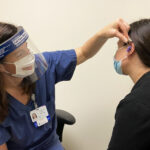As people age, their hearing gradually fades. Naomi Fireman, AuD, CCC-A, explains how this occurs and how to mitigate its toll.

Age-related hearing loss, or presbycusis, is one of the most common conditions adults experience as they age. In fact, according to the National Institute on Deafness and Other Communication Disorders, more than half of adults report some sort of difficulty hearing by the time they reach 75.
Naomi Fireman, AuD, CCC-A, an audiologist at Mass Eye and Ear, has made it her goal to help individuals with hearing loss better understand the condition and help patients find the techniques and strategies capable of helping them cope with this natural form of hearing loss.
Focus caught up with Dr. Fireman to learn more about age-related hearing loss, its social-emotional toll on patients and how hearing aids can make a huge difference in a patient’s quality of life.
What is age-related hearing loss?
The ability to hear depends on a group of sensory cells in the inner ear called hair cells, or stereocilia, which detect sound vibrations entering the ear canal. Hair cells convert these sound vibrations into signals sent to the brain via a complex circuit of auditory nerve pathways. While hair cells help amplify the volume of sound, the connection between the auditory nerve and these cells determines how clearly the sound is heard and processed.
Like most cells in the body, hair cells do not live forever and, unlike a red blood cell or a skin cell, these cells cannot regenerate once damaged. For most individuals, the earliest signs of age-related hearing loss can occur in their forties or fifties, when hair cells typically begin to decay, and worsens gradually over time. The earliest signs of decay is difficulty hearing high-frequency sounds.
According to Dr. Fireman, the onset of symptoms is gradual. Many patients might initially report difficulty hearing the voices of women and children, both of whom possess higher-pitched voices than men. More often than not, noise-induced hearing loss can often overlay these symptoms, further complicating its diagnosis.
“Think of the last time you went to a really loud concert or sporting event, and it was so loud that you felt your ears ringing after you’ve left,” said Dr. Fireman. “Well, that ringing actually means you’ve sustained some kind of damage inside your ears. There’s reason to believe it can affect how well you’ll hear later in life.”
How does this hearing loss affect quality-of-life?
Hearing loss is not just measured in decibels. Rather, the condition is linked to feelings of depression, anxiety, frustration, social isolation and cognitive decline. At work or at home, the condition frequently affects someone’s ability to listen and understand ordinary tasks and can affect the way they engage with those closest to them.

“Patients might feel a sense of embarrassment when they can’t follow a conversation like they once used to,” said Dr. Fireman. “When playing games with family and friends or going out to eat, they might prefer to sit there and nod instead of asking someone to repeat what they just said.”
Patients with age-related hearing loss also experience fatigue from trying to keep up with these conversations. Individuals who cannot hear clearly might attempt to lip read or lean into a conversation. However menial these tasks may seem, its cumulative effects take energy away from other important aspects of life for older individuals, such as memory cognition and productivity.
Many patients refuse to acknowledge their symptoms until the burden of their condition begins to burden those around them. Those who live with these patients might feel irritated by their inability to effectively communicate with a loved one. Some may think raising their voice or shouting will help the individual with hearing loss better understand a conversation.
If anything, Dr. Fireman explained, this approach only confuses or exasperates the individual. Rephrasing a sentence, or speaking at a slower pace, proves much more effective and induces much less anxiety, as does facing the person when speaking as opposed to speaking away from the person or at an angle.
The earlier the intervention, the better
While no treatment can reverse the effects of age-related hearing loss, the sound clarity a patient experiences can decay at a faster pace if a patient does not opt for an immediate intervention. When inner ear hair cells begin to degrade, the ear loses its natural source of amplification to the auditory pathway. The longer the auditory nerve goes without receiving sound signals, the more difficulty it has recognizing those signals when they return.
One such intervention, a hearing aid, can help restore the lost amplification by increasing the volume of sounds entering the ear. An unfortunate stigma associated with hearing aids has deterred people away from wearing the devices over the past few decades.
“It’s almost like that saying, ‘If you don’t use it, you’ll lose it,’” she said. “The sooner a patient with hearing loss can begin using a hearing aid, the more success they’ll have in sustaining sound clarity for a longer period of time.”
Although new legislation allowing the sale of over-the-counter hearing aids could help make the devices much more accessible, the appearance of the device and general lack of knowledge about its benefits can continue to hamper people’s willingness to wear one. The encouragement of family and friends, Dr. Fireman insisted, could ultimately help patients feel more comfortable wearing the device.
Before wearing one, she encourages patients interested in hearing aids to undergo a diagnostic evaluation to better understand their degree of hearing loss. While over-the-counter hearing aids can offer a great convenience to patients with mild-to-moderate hearing loss, those who experience asymmetries or differences in hearing between the ears should have a licensed clinician rule out any other medical issues that might warrant serious attention.
Dr. Fireman also cautioned patients not to treat hearing aids as an ultimate solution, either.
“I always tell patients not to expect their hearing to return to the way it was when they were 30 years old,” she added. “But, with the support of friends, family and other communication partners practicing effective communication skills, we can at least help these patients regain an important part of their quality of life.”
For a full list of effective communication strategies, click here.



